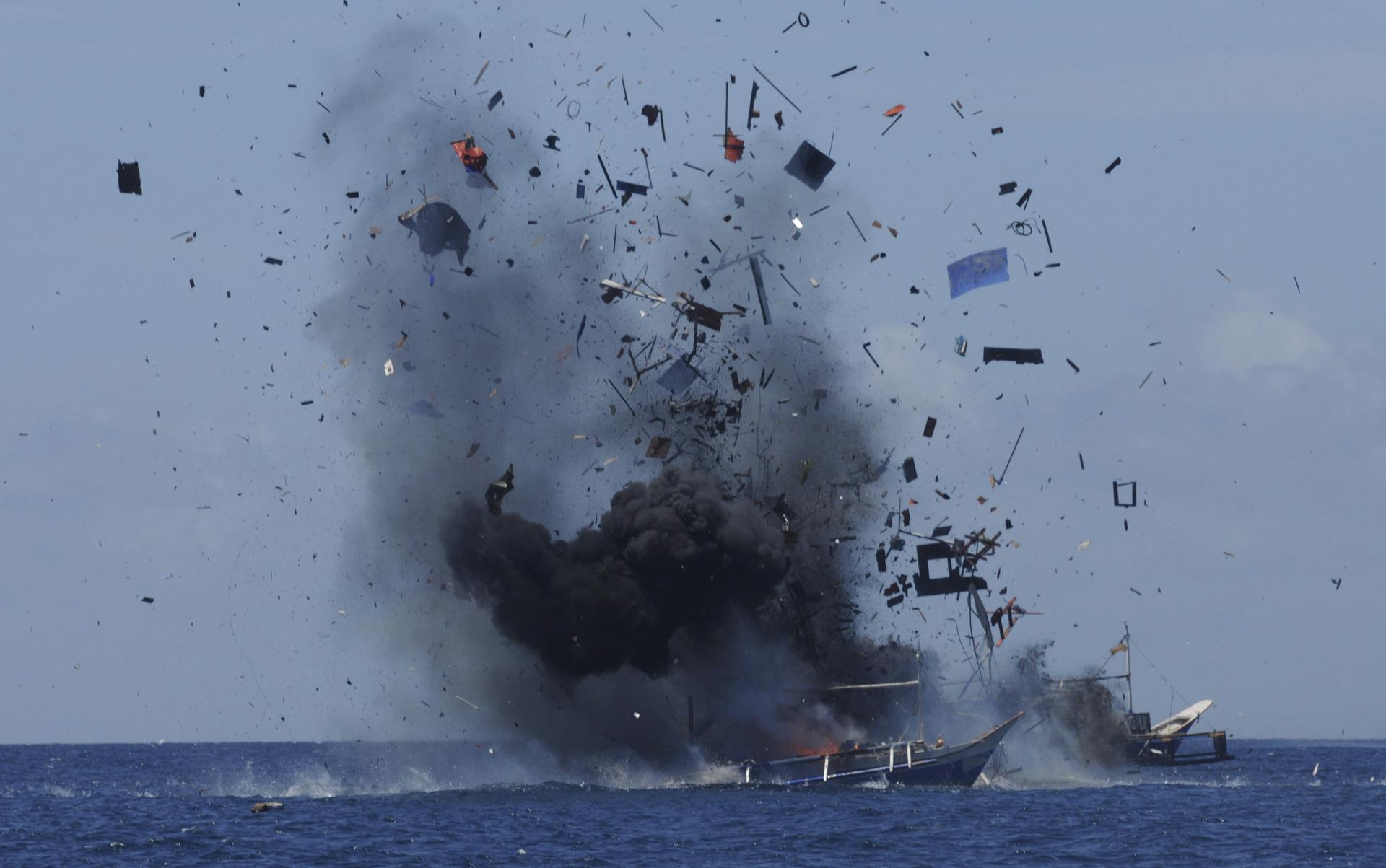Why Indonesia keeps blowing up boats on TV
The Indonesian navy blows up foreign boats caught fishing illegally in Indonesian waters near Bitung, North Sulawesi, May 20, 2015.
Indonesia, responsible for guarding some of the world’s most precious fishing waters, has a message to seafaring poachers.
Sail into our waters illegally if you dare. But if we catch you, we will toss you in prison and detonate your boat in a massive fireball. And we will destroy it on television so a grateful nation can cheer us on.
Indonesia’s president, Joko Widodo, has a phrase for this aggressive anti-poaching strategy: “shock therapy.” His cabinet contends that, before the crackdown began, nearly 5,500 foreign fishing boats plied Indonesia’s waters each day — and only one in 10 was operating legally.
That was before officials blew up 200 boats seized from poachers, many of them caught hunting tuna. They say pirates are now getting the message. The campaign, according to the government, has driven down illegal fishing by 90 percent.
The raw spectacle of exploding ships — blasts of orange flame and charred planks flung in all directions — has proven very popular in Indonesia. Those who’ve lost jobs to poachers watch the destruction of their enemies’ boats with glee.
So do many environmentalists. The Indonesian government’s “extraordinary efforts” are “terminating the operation of illegal fishing vessels forever,” says Arifsyah Nasution, an Indonesian campaigner with Greenpeace.
Just 10 years ago, according to United Nations stats, Indonesia’s fisheries employed more than 6 million people. Government ministers now say the number of households that earn their primary income from fish is under 1 million — and they blame poachers for depleting the waters of so many fish.
The culprits, they say, are invading trawlers from nearby nations, such as Vietnam, as well as nations as distant as Nigeria.
Indonesia’s navy is now aggressively hunting down illegal ships. Its latest catch — a notorious Chinese poaching ship wanted by Interpol — was detained on April 26. The Indonesian government may revel in the boat’s capture by blowing it up on television.
Indonesia may seem far away to Westerners, but its war on poaching is partly driven by a voracious US appetite for seafood.
By virtue of its long coastlines, Indonesia has been forced onto the front lines of a global struggle against overfishing — an ecological catastrophe created in large part by demand from wealthier nations.
The top importer of Indonesian seafood is the United States, followed by Japan and the European Union. Affluent nations are devouring seafood faster than fish can breed. And fishermen from poorer nations, poachers and legit boatmen alike, compete fiercely to suck the seas dry.
The planet’s fish are disappearing at a terrifying rate. Marine life populations, according to the World Wildlife Fund, have been cut in half in the last four decades.
No one feels this crisis more than Indonesian fishermen. As the years grind on, their nets grow lighter. And each time the government blasts a poacher’s boat into a mess of floating debris, it taps into the public’s fear of a future without fish.
Environmentalists have just one quibble with the anti-poaching campaign. Arifsyah and others would prefer that officials stop littering the ocean with bits of exploded boat. “The blowing-up method,” Arifsyah says, “is not necessary.”
We want to hear your feedback so we can keep improving our website, theworld.org. Please fill out this quick survey and let us know your thoughts (your answers will be anonymous). Thanks for your time!
